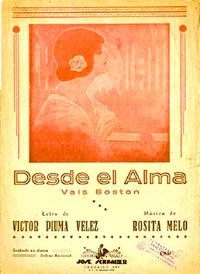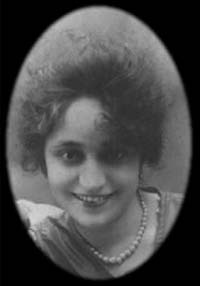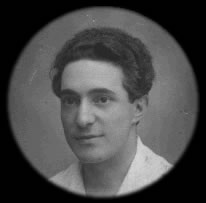By
Desde el alma - "Desde el alma", a romantic criollo waltz

he young girl —just fourteen years old— laid her fingers on the black and white keyboard of the piano. Hardly may she have guessed that the keys she had decided to play would strike the notes for one of the most popular melodies in Buenos Aires and, why not?, in all the world.
 One after another, quarter and sixteenth notes were shaping a beautiful romantic melody, while the left hand was playing the no less romantic waltz beat. Everything was springing from her soul, like one of her teen-age dreams. Because of that there was no other possible title and she called it, precisely, “Desde el alma”.
One after another, quarter and sixteenth notes were shaping a beautiful romantic melody, while the left hand was playing the no less romantic waltz beat. Everything was springing from her soul, like one of her teen-age dreams. Because of that there was no other possible title and she called it, precisely, “Desde el alma”.
It was an ordinary day in 1911 and, time later, the girl held in her hands the first recording of her waltz, made by the Roberto Firpo’s orchestra.
Later came a huge number of renderings committed to record to consecrate its composer, Rosa Clotilde Mele, born in Montevideo on July 9, 1897. She was widely known by her nom de plume: Rosita Melo.
 As from 1900 Rosita settled, with her family, in Buenos Aires and here she released all her oeuvre, such as the tangos “Tatita” and “Oración”, pasodobles, marches, polkas, estilos, but none reached the acclaim or became a boom like “Desde el alma” did.
As from 1900 Rosita settled, with her family, in Buenos Aires and here she released all her oeuvre, such as the tangos “Tatita” and “Oración”, pasodobles, marches, polkas, estilos, but none reached the acclaim or became a boom like “Desde el alma” did.
In 1922 the pianist married Víctor Piuma Vélez, who soon adapted lyrics to the already quite popular waltz composed by his wife.
As well a couple of lyrics by unknown authors were added to the composition. Like the one which began as follows: «Desde el alma te adora mi cariño».
But the consecrating and definitive lines were written in 1948 by Homero Manzi, for the movie “Pobre mi madre querida” with Hugo del Carril on vocals. Piuma Vélez’s name also appears in the sheet-music published for the movie. Maybe the latter collaborated in it or, what it’s most likely, it was the result of an agreement between both.
 A long time passed since 1911, but “Desde el alma” still is, undoubtedly, a synonym of waltz in Argentina.
A long time passed since 1911, but “Desde el alma” still is, undoubtedly, a synonym of waltz in Argentina.
Rosita graduated as piano teacher at the Thibau-Piazzini conservatory and later she qualified as concert pianist with a gold medal. She played concerts of classical and popular music at the most important cultural centers of the period. She was awarded numerous medals and prizes, and as well received warmth applauses.
She died in Buenos Aires on August 12, 1981.